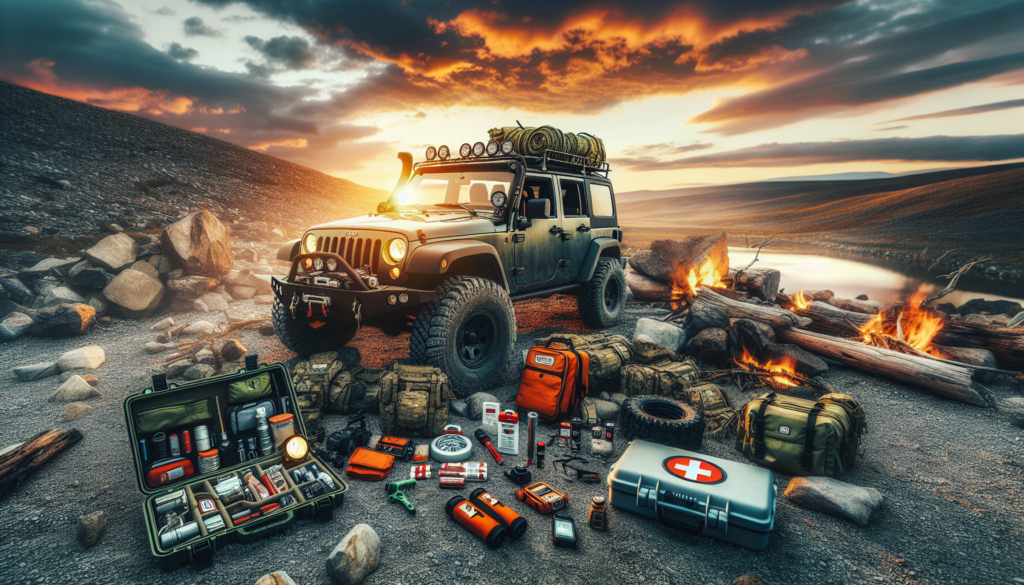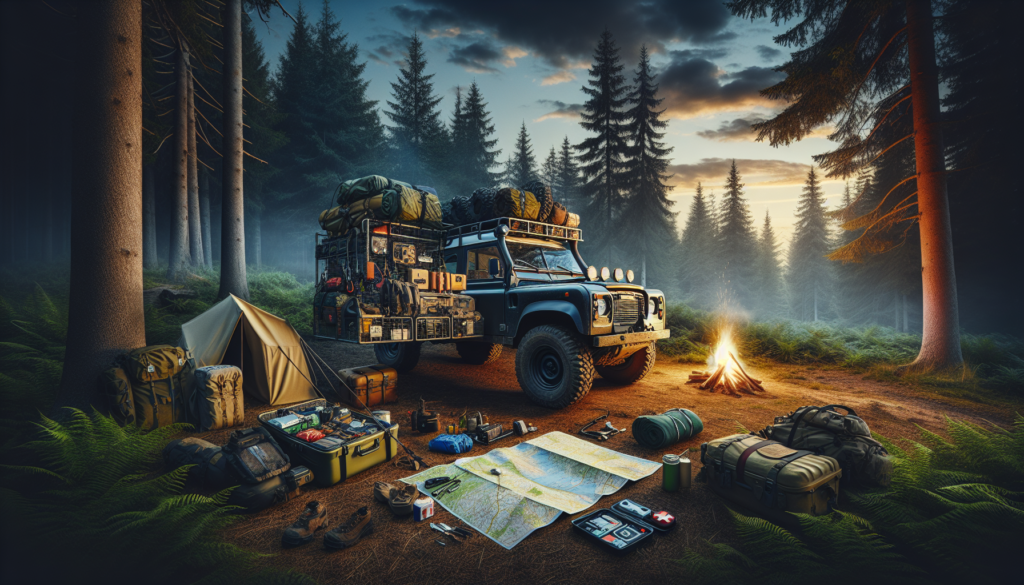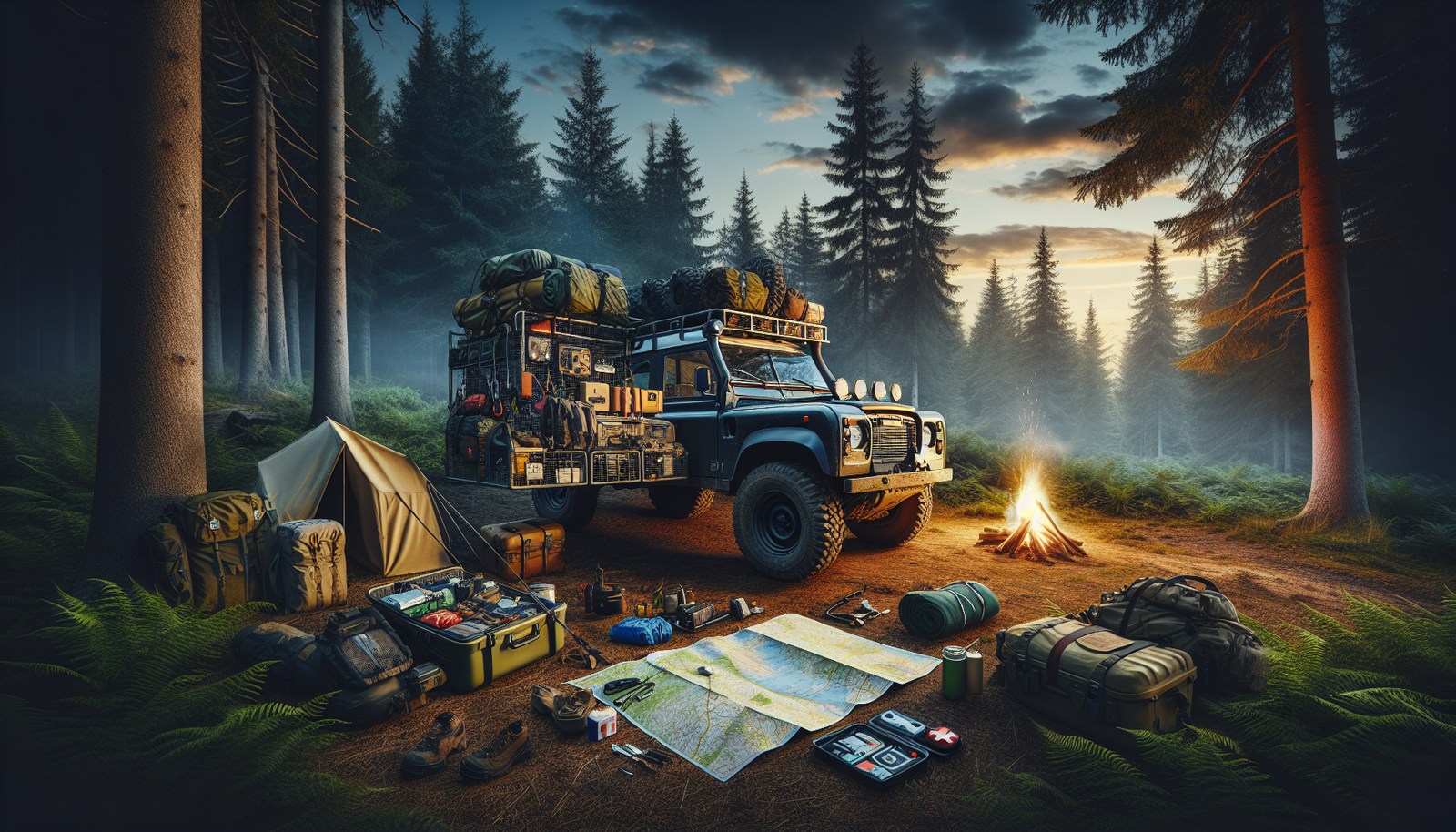Are you an adventurous soul with a passion for overlanding? As thrilling as this experience can be, it is crucial to ensure that you are prepared for any emergencies that may arise along the way. From unexpected breakdowns to medical emergencies in remote areas, being equipped with the right knowledge and supplies can make all the difference. In this article, we will explore practical tips and guidelines to help you effectively prepare for emergencies while overlanding, ensuring a safe and memorable journey on the road less traveled. Overlanding is a thrilling adventure that allows you to experience the great outdoors and explore remote and off-the-beaten-path destinations. However, just like any outdoor activity, overlanding comes with its fair share of risks and uncertainties. To ensure your safety and peace of mind during your overlanding expeditions, it is crucial to be prepared for emergencies. This article will guide you through the essential steps to take in order to prepare for any unforeseen circumstances that may arise while overlanding.
General Preparations
Check weather conditions
Before embarking on your overlanding journey, it is essential to check the weather conditions of the area you will be visiting. This will help you prepare for any potential weather-related emergencies and make suitable adjustments to your plans.
Research the area
Thoroughly researching the area you will be overlanding is another crucial step in preparing for emergencies. Familiarize yourself with the terrain, local laws and regulations, potential hazards, and any other relevant information. This knowledge will enable you to plan your route effectively and be aware of any potential dangers.
Create an emergency plan
Having a well-thought-out emergency plan is essential for any overlanding adventure. Your emergency plan should include contact information for local emergency services, nearby hospitals, and any other relevant support services. It is also important to communicate your travel plans and itinerary with a trusted friend or family member who can assist in case of an emergency.
Vehicle Maintenance
Perform a thorough inspection
Before hitting the road, it is crucial to conduct a thorough inspection of your vehicle. Check for any signs of damage, leaks, or wear and tear. Ensure that all lights, brakes, and other safety features are in proper working condition. Identifying and fixing any potential issues before your trip can help prevent mechanical breakdowns and emergencies on the road.
Check and replace essential fluids
Maintaining proper fluid levels in your vehicle is vital for its overall performance and reliability. Check and top up essential fluids such as engine oil, coolant, brake fluid, and transmission fluid. If any fluids are low or dirty, replace them according to the manufacturer’s recommendations. This proactive maintenance approach will minimize the risk of overheating or mechanical failures.
Evaluate tire condition and carry spares
Your tires are the only point of contact between your vehicle and the road, making their condition crucial for safety while overlanding. Check the tread depth, sidewalls, and tire pressure. Replace any worn-out or damaged tires before your trip. Additionally, always carry spare tires and the necessary tools to change them, as flat tires are a common occurrence during overlanding adventures.

Navigation and Communication
Carry detailed maps and navigation tools
In the age of GPS navigation, it’s easy to rely solely on technology. However, it is crucial to have a backup plan in case your GPS fails or loses signal. Carrying detailed maps of the areas you will be traveling through, as well as a compass and a reliable navigation tool, can save you from getting lost in unfamiliar terrain.
Invest in a reliable GPS system
While having backup navigation tools is essential, investing in a reliable GPS system designed for off-road use can greatly enhance your overlanding experience. Look for a GPS unit that offers detailed topographic maps, waypoint tracking, and offline navigation capabilities. This will provide you with accurate and real-time navigation information, even in remote areas with limited cellular coverage.
Pack a satellite phone or emergency beacon
In remote areas, it’s not always possible to rely on regular cellular coverage to communicate in case of emergencies. Investing in a satellite phone or an emergency beacon is highly recommended. These devices use satellite networks to transmit distress signals or make emergency calls, ensuring that you can reach help even when regular communication channels are not available.
First Aid and Medical Supplies
Assemble a comprehensive first aid kit
A well-stocked and comprehensive first aid kit is essential for any overlanding adventure. Your kit should include items such as bandages, antiseptic ointment, pain relievers, adhesive tape, scissors, and other basic medical supplies. Make sure all items are in good condition and check expiry dates regularly to ensure the effectiveness of the contents.
Learn basic first aid skills
Having a first aid kit is not enough; it is crucial to have the knowledge and skills to administer basic first aid in case of an emergency. Consider enrolling in a certified first aid and CPR course to learn how to handle common injuries, perform CPR, and provide immediate medical assistance until professional help arrives. These skills can make a significant difference in critical situations.
Include prescription medications
If you or any members of your travel party require prescription medications, ensure that you have an ample supply of these medications for the duration of your overlanding expedition. It is also advisable to carry a copy of the prescriptions and any important medical information, such as allergies or pre-existing conditions, to provide to medical professionals in case of an emergency.

Food, Water, and Shelter
Stock up on non-perishable food
When overlanding, it is essential to have an adequate supply of non-perishable food. Choose items that are lightweight, easy to prepare, and provide sufficient nutrition. Canned goods, dehydrated meals, granola bars, and dried fruits are excellent options. Aim for a variety of food items to ensure a balanced diet during your journey.
Carry an ample supply of drinking water
Access to clean and safe drinking water is crucial for your well-being while overlanding. Carry a sufficient supply of water for drinking, cooking, and hygiene purposes. If your journey takes you through remote areas where water sources may be scarce, consider investing in a portable water filtration system or water purification tablets to ensure a constant supply of potable water.
Pack appropriate camping gear
When overlanding, having appropriate camping gear is essential for your comfort and safety. Ensure you have a sturdy tent or shelter, sleeping bags, camping stove, cooking utensils, and other necessary camping equipment. It’s also a good idea to pack extra blankets and warm clothing to protect yourself from cold weather conditions.
Emergency Tools and Equipment
Carry a basic tool kit
Having a basic tool kit is crucial for conducting minor repairs or adjustments to your vehicle while overlanding. Include tools such as wrenches, pliers, screwdrivers, and duct tape. Familiarize yourself with the basic maintenance tasks for your vehicle, such as changing a flat tire or replacing a fuse, and carry the necessary tools to perform these tasks.
Have a reliable fire extinguisher
In the event of a vehicle or campfire-related emergency, a fire extinguisher can be a lifesaver. Make sure you have a reliable and properly maintained fire extinguisher easily accessible in your vehicle. Familiarize yourself with its operation and ensure that all passengers traveling with you are aware of its location and how to use it.
Include a winch and recovery equipment
Overlanding often involves traversing challenging terrains where your vehicle may get stuck. Having a winch and recovery equipment can help you get out of sticky situations. Invest in a reliable winch, recovery straps, shackles, and a shovel. Knowing how to use these tools properly and safely is essential, so consider taking a recovery training course if you are new to off-roading.
Safety Precautions
Inform someone about your travel plans
Before embarking on your overlanding adventure, make sure to inform a trusted friend or family member about your travel plans. Provide them with a detailed itinerary, including your planned routes, destinations, and expected return date. Check-in with them periodically, especially if you change your plans, so that someone knows where to find you in case of an emergency.
Drive defensively and cautiously
When overlanding, it is crucial to drive defensively and cautiously, especially in off-road conditions. Be aware of your surroundings, anticipate potential hazards, and adjust your driving speed accordingly. Always follow the local traffic laws, wear your seatbelt, and avoid distractions while driving to minimize the risk of accidents.
Avoid venturing out alone
Overlanding is an adventure best enjoyed with company. Whenever possible, avoid venturing out alone, especially in remote or unfamiliar areas. Traveling with others not only enhances the overall experience but also provides an additional layer of safety. In case of an emergency, having someone to assist or seek help can make all the difference.
Weather-related Emergencies
Prepare for extreme weather conditions
When overlanding, you may encounter extreme weather conditions such as heavy rain, snowfall, or extreme heat. Be prepared for these situations by packing appropriate clothing and gear. Waterproof jackets, thermal layers, sun hats, and sunscreen should be part of your essential gear. Additionally, ensure that your vehicle is equipped with suitable tires and that all windows and doors are properly sealed to withstand adverse weather.
Keep an eye on severe weather forecasts
Staying updated with the latest weather forecasts and alerts is essential to avoid getting caught in severe weather conditions while overlanding. Utilize reliable weather apps, websites, or listen to local radio stations for the most accurate and up-to-date information. If severe weather is predicted in your area, consider altering your route or finding suitable shelter until the conditions improve.
Take necessary precautions
In case of severe weather conditions, take the necessary precautions to protect yourself and your vehicle. If heavy rain or flooding is expected, avoid driving through deep water and seek higher ground. If you encounter a thunderstorm, find shelter away from tall trees or elevated areas that may attract lightning strikes. It’s better to err on the side of caution and wait out the extreme weather than to put yourself and your vehicle at risk.
Mechanical Breakdowns
Learn basic vehicle repair skills
While it is impossible to predict every mechanical breakdown that may occur during your overlanding adventure, having basic vehicle repair skills can prove to be invaluable. Get familiar with your vehicle’s manual, learn how to identify common issues, and practice simple repairs such as changing a flat tire, replacing a fuse, or jump-starting a battery. These skills can help you get safely back on the road if a mechanical breakdown occurs.
Carry spare parts and essential tools
While you may not be able to carry every spare part your vehicle might need, it is advisable to have some essential spare parts on hand. Items such as spare bulbs, fuses, fan belts, and filters can come in handy in case of a breakdown. Additionally, carry a suitable set of tools to help you perform basic repairs or temporarily fix issues until you can reach professional assistance.
Stay updated on vehicle recalls
To minimize the risk of mechanical breakdowns, stay updated on any vehicle recalls or service bulletins related to your specific make and model. Regularly check with the manufacturer or authorized dealers for any safety-related issues or recommended maintenance procedures. Taking prompt action on recalls or service recommendations ensures that your vehicle remains reliable and safe for your overlanding journeys.
Natural Disasters
Understand the risks of the area
Depending on the region you plan to overland in, there may be specific natural disasters or hazards to be aware of. Research and understand the specific risks of the area you will be visiting. This includes potential earthquakes, floods, wildfires, or other natural disasters that may be prevalent in the region. Understanding these risks will allow you to take necessary precautions and be better prepared for emergencies.
Prepare for earthquakes, floods, or wildfires
If your overlanding adventure takes you to regions prone to earthquakes, floods, or wildfires, it is crucial to be prepared for these specific hazards. Familiarize yourself with emergency procedures for each type of disaster, such as knowing how to “Drop, Cover, and Hold On” during an earthquake, or having an evacuation plan in place for wildfires or floods. Carry necessary emergency supplies that may be specific to these types of disasters, such as fire blankets, life jackets, or emergency flares.
Know evacuation routes and shelters
When exploring areas prone to natural disasters, it is essential to know the evacuation routes and designated shelters. Keep a map of the local area handy, highlighting the safest routes to higher ground or designated emergency shelters. Familiarize yourself with the local emergency management agency’s recommendations and follow their guidance in case of a natural disaster. Being aware of evacuation routes and shelters can be life-saving in emergency situations.
By following these comprehensive preparations, you can ensure a safer and more enjoyable overlanding experience. Remember, being prepared for emergencies is not about expecting the worst, but rather being equipped to handle any unforeseen circumstances that may arise. So pack your gear, buckle up, and embark on your overlanding adventure with confidence, knowing that you are ready to overcome any challenge that comes your way. Happy travels!

